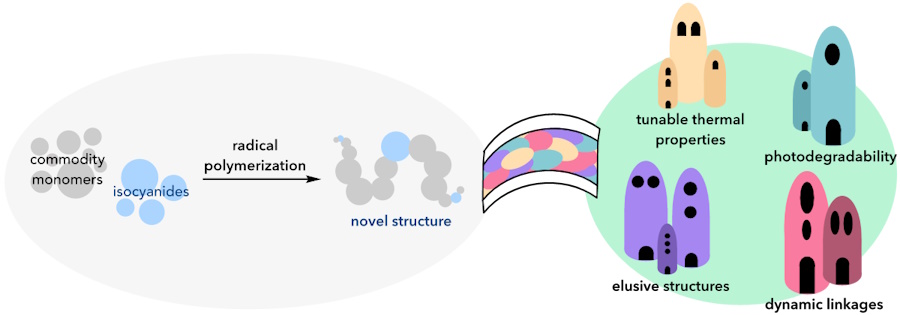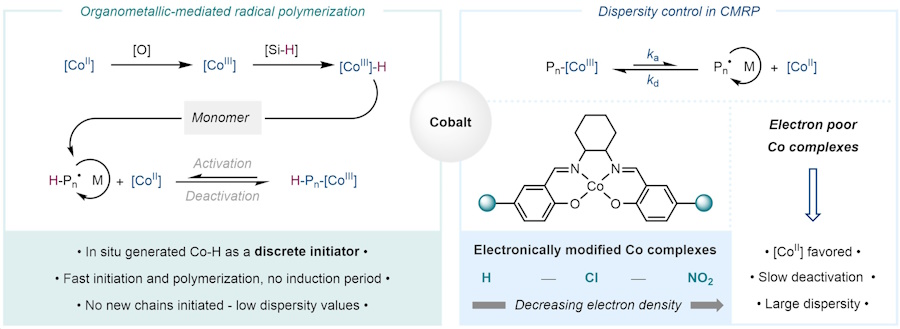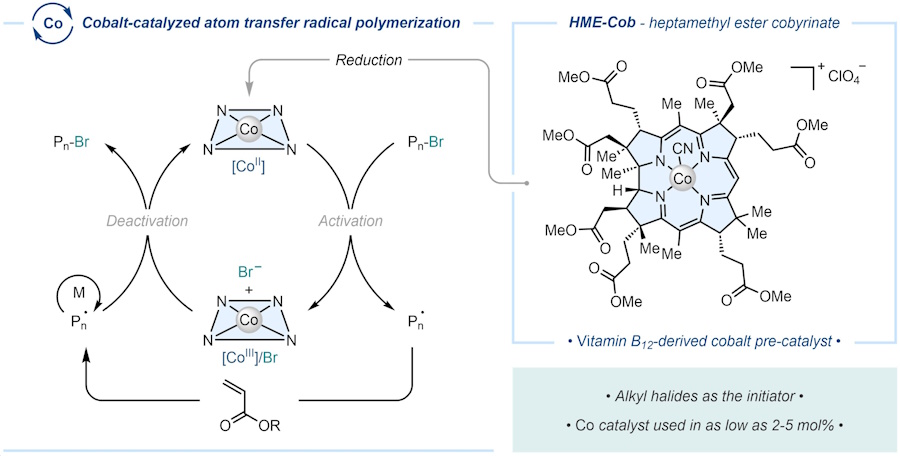Degradable and reusable plastics are essential for mitigating consequences from plastic waste accumulation in the environment. Of immense interest is a strategy that programs degradable functionality into the polymer microstructure while maintaining well-designed polymer properties. In the Stache lab, we intend to install isocyanides via a radical polymerization mechanism into commodity polymers to impart new and useful properties.

These new materials display interesting reactivity and adaptability – the responsive characteristics imparted by the imine linkage directly on the polymer backbone can be selectively modified at different points in the polymer lifecycle to be easily upcycled into new materials with vast and tunable characteristics. Consequently, access to many different microstructures is achieved through the synthesis of one copolymer. This highly interdisciplinary project has far-reaching applications, from polymerization method development, polymer structure characterization, material property characterization, and synthetic transformations/post-polymerization modifications. This approach offers a synthesis of novel copolymers, showing promise to replace single use plastics with one that can be continually repurposed or broken down in the environment, providing the opportunity for a non-accumulative waste stream.
Development of Novel Polymerization Techniques using Cobalt Catalysis
Transition metals mediating one-electron redox processes are of great importance in mediating controlled radical polymerization reactions. In the Stache Lab, we are interested in the development of new strategies in controlled radical polymerizations by designing efficient transition-metal complexes and the discovery of novel chemical reactivities, as well as their use in the synthesis of advanced polymer materials.
We developed a discrete initiation approach in cobalt-mediated radical polymerization (CMRP) using cobalt hydride that enabled fast and efficient initiation via hydrometallation of the vinyl monomer while the cobalt complex provided control over the growth polymer chains via an organometallic mechanism. Discrete initiation of CMRP processes enabled fast kinetics and excellent control over the polymerization overcoming the limitations of conventional approaches showing slow initiation and long induction periods where the continuous flux of initiating radicals deviates polymerization control.
We discovered that the discrete nature of the initiator allowed additional possibilities to control the molecular weight and dispersity of polymers by leveraging the electronic properties of the cobalt complexes and consequently their polymerization efficiency not accessible via conventional initiation approaches.

While cobalt complexes typically undergo an organometallic mechanism forming a C-Co bond with polymer chains, we recently devised a catalytic strategy to impart atom transfer reactivity for cobalt in controlling radical polymerizations. We showed that a cobalt complex featuring a corrin macrocycle derived from vitamin B12 selectively catalyzed atom transfer radical polymerization by an efficient exchange of polymer chains between active and dormant states via bromine atom transfer using alkyl halide initiators. The atom transfer reactivity of the cobyrinate complex allowed using <5% of cobalt as a catalyst where the CMRP processes undergoing an organometallic pathway require 100% cobalt to control the growth of polymer chains.
We anticipate that the structural modification and the design of new complexes will unravel novel chemical reactivities for cobalt in controlled radical polymerizations for the synthesis of advanced polymers.

